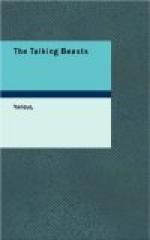These gifts of yours shine rather dim,
Since neither like the trout you swim,
Nor like the deer, step swift and light,
Nor match the eagle in your flight.”
They err who think that merit clings
To knowledge slight of many things;
He who his fellows would excel,
Whate’er he does should do it well.
The Tea and the Sage
The Tea from China on her way,
Met in some sea, or gulf, or bay—
(Would to her log I might refer!)
The Sage, who thus accosted her:
“Sister—ahoy! ho—whither
bound?”
“I leave,” she said, “my
native ground
For Europe’s markets, where, I’m
told,
They purchase me by weight of gold.”
“And I,” the Sage replied,
“am seeking
The route to Canton or to Peking;
Your Chinese use me largely in
Their cookery and medicine;
They know my virtues, nor deny
The praise I ask, however high,
While Europe scorns me, just indeed,
As if I was the vilest weed.
Go; and good luck t’ye; know full
well
That you are sure enough to sell,
For nations all, (fools that they are!)
Value whatever comes from afar,
And give their money nothing loth,
For anything of foreign growth.”
The Swan and the Linnet
Piqued at the Linnet’s song one
day,
The Swan exclaimed: “Leave
off! I say—
Be still, you little noisy thing!
What!—dare you challenge
me to sing,
When there’s no voice, however fine,
Can match the melody of mine?”
(The Linnet warbled on)—“D’ye
hear?
This impudence may cost you dear;
I could with one harmonious note
Forever stop your squeaking throat,
And, if I do not choose to try,
Respect my magnanimity.”
“I wish,” at length the Linnet
said,
“I wish, to heaven, the proof were
made;
You cannot imagine how I long
To hear that rich and flowing song
Which though so sweet, by fame averred,
I know not who has ever heard.”
The Swan essayed to sing, but—whew! She screeched and squalled a note or two, Until the Linnet, it appears, Took to her wings to save her ears. ’Tis strange when some of learned fame Will prove their title to the name, How often ill-placed praise they mar, And show how ignorant they are.
The Flint and the Steel
The Flint, with language harsh and high,
Accused the Steel of cruelty
In striking her with all his might,
Whene’er he wanted fire and light.
The Steel the imputation spurned,
And with such warmth the contest burned
That both, at last, agreed to slip
Their contract of companionship.
“Good-by then, madame,” said
the one;
“And since my company you shun,
And to continue with me, doubt,
We’ll see what use you are without.”
“About as much as you will be,
Good sir,” she answered, “without
me.”




